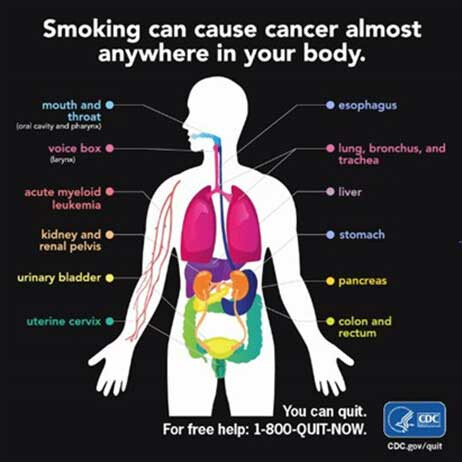Break Free from Tobacco: Your Journey to a Healthier Life Starts Now

The Facts About Smoking
- Cigarette smoking causes more than 480,000 deaths each year in the United States. This is nearly one in five deaths.
- Smoking causes more deaths than HIV, Illegal drug use, alcohol use, vehicle accidents and gun related incidents combined.
- Smoking can make it harder to women to become pregnant and it can affect the baby's health before and after birth.
- Smoking can affect men's sperm which can reduce fertility and increase the risk of birth defects and miscarriage.
- Smoking causes inflammation and decreased immune function.4

The Facts About Vaping
- Scientists are still learning the long-term health effects of e-cigarettes. Here is what is currently known:
- Most e-cigarettes contain nicotine, what has known health effects
- Highly addictive
- Toxic to developing fetuses
- Harmful to adolescent brain development, which continues into the early to mid-20s Nicotine is a health danger for pregnant women and their developing babies. 1
- Aside from nicotine, the aerosol from e-cigarettes can contain harmful substances including cancer causing chemicals and tiny particles which reach deep into the lungs. 1
- E-cigarettes can cause unintended injuries:
- Defective batteries can cause fires and explosions
- Acute nicotine exposure can be toxic. Children and adults have been poisoned by swallowing, breathing, or absorbing e-cigarette liquid. 1
- E-cigarettes are NOT currently approved by the FDA as a quit smoking aid. 1
- Most e-cigarettes contain nicotine, what has known health effects
The Facts About Smokeless Tobacco
Smokeless tobacco is associated with many health problems. Using smokeless tobacco:
- Can lead to nicotine addiction
- Causes cancer of the mouth, esophagus (the passage that connects the throat to the stomach), and pancreas (a gland that helps with digestion and maintaining proper blood sugar levels)
- Is associated with diseases of the mouth
- Can increase risks for early delivery and stillbirth when used during pregnancy
- Can cause nicotine poisoning in children
- May increase the risk for death from heart disease and stroke 3
Are You Ready to Quit?
- Commit to quit! Set a quit date, give yourself time to prepare, don't put it off too long. 5
- Know your why If you identify why you are quitting, you can use this to strive towards. 6
- Find ways to handle your nicotine withdrawal. Common symptoms may be: feeling anxious, sad, depressed, Having urges/cravings to smoke, feeling irritated/grouchy/upset, feeling jumpy or restless, difficulty concentrating, insomnia, feeling hungrier and possibly weight gain. 4 To help with these symptoms, be active (engage in physical activity), spend time with friends who don't smoke, keep busy and distract yourself, or talk to your healthcare provider about medication to help! Additionally, you can use safe substitutes for cigarettes such as use toothpicks or straws, chew gum, or use a squeeze ball to distract yourself. 4
- Explore support options: Join a support group in person or on social media, try a text message program, or visit smokefree.gov online for more resources. 5
- Tell your friends and family you are going to quit. They can help encourage you. Ask a friend or family member to quit with you! 6
Health Benefits of Quitting Smoking
- Improves health and increases life expectancy
- Lowers risk of 12 types of cancer
- Lowers risk of cardiovascular disease
- Lower risk of obstructive pulmonary disease (COPD)
- Lowers risk of some poor reproductive health outcomes
- Benefits people who have already been diagnosed with coronary heart disease or COPD
- Benefits people at any age – even people who have smoked for years or have smoked heavily will benefit from quitting.
Talk to your healthcare provider today to start your quit plan. Click here to easily find a Family Medical Centers services provider by name, specialty, or the location most convenient for you.
References:
- CDC. (n.d.). Electronic Cigarettes What's the Bottom Line? https://www.cdc.gov/tobacco/basic_information/e-cigarettes/pdfs/Electronic-Cigarettes-lnfographic-p.pdf
- CDC. (2020a). Health Benefits of Quitting Smoking. https://www.cdc.gov/tobacco/quit_smoking/how_to_quit/benefits/index.htm
- CDC. (2020b). Smokeless tobacco: Health effects. https://www.cdc.gov/tobacco/data_statistics/fact_sheets/smokeless/health_effects/index.htm#addiction
- CDC. (2021). Health Effects of Cigarette Smoking. https://www.cdc.gov/tobacco/data_statistics/fact_sheets/health_effects/effects_cig_smoking/index.htm#reduced-risks
- CDC. (2022). Common Withdrawal Symptoms. https://www.cdc.gov/tobacco/campaign/tips/quit-smoking/7-common-withdrawal-symptoms/index.html
- Smokefree.gov. (n.d.). Quitting Starts Now. Make Your Quit Plan. https://smokefree.gov/build-%20your-quit-plan



